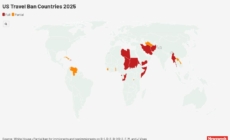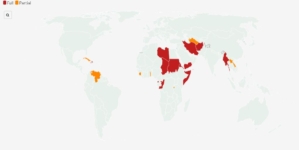-
Map Shows the 50 Best School Districts Across US - 41 mins ago
-
Marines, in a Rare Move, Briefly Detain Man in Los Angeles - 50 mins ago
-
How to Watch Oregon State vs Louisville: Live Stream College Baseball World Series, TV Channel - about 1 hour ago
-
Investigators Search for Clues to the Air India Crash - 2 hours ago
-
Shelter Dog Looks At Woman With ‘So Much Trust’, Unaware What Visit Means - 2 hours ago
-
National Parks Are Told to Delete Content That ‘Disparages Americans’ - 2 hours ago
-
And Just Like That… Season 3 Episode 4 – Release Date, Schedule, How To Watch - 2 hours ago
-
Washington Commanders Coach Delighted With Deebo Samuel - 3 hours ago
-
Air India’s New Owners Were Trying to Revamp Carrier Before Crash - 3 hours ago
-
Saints Sign Cam Akers in Massive Free Agency Move - 4 hours ago
US Toughens Stance on Iran, Raising Risk of War
U.S. demands on Iran’s nuclear program are hardening ahead of renewed talks, with Washington now seeking the full elimination of uranium enrichment above what is needed for power generation and verification of missile stockpiles.
The tougher stance departs from earlier signals that limited civilian enrichment might be allowed. The shift is likely to complicate diplomacy and raises the risk of military action if talks fail.
U.S. Special Envoy Steve Witkoff said that any agreement must end Iran’s “nuclear enrichment and weaponization efforts.”
Newsweek has reached out to the State Department and Iran’s foreign ministry for comment.
Why It Matters
The U.S. shift could raise the stakes for diplomacy, signaling that Washington seeks more than a return to the 2015 nuclear deal (JCPOA), which President Donald Trump exited in 2018. Since then, Trump has reimposed sweeping sanctions under a “maximum pressure” policy and repeatedly warned of military action if Iran advances toward a nuclear weapon. Iranian officials have long said their nuclear program is peaceful and that they honored the JCPOA until the U.S. withdrew.

Mark Schiefelbein/AP Photo
What to Know
Witkoff’s statement, posted on X, marked a clear hardening of the U.S. stance, “Iran must stop and eliminate its nuclear enrichment and weaponization program.” The U.S. is also pressing for oversight of Iran’s missile program. Witkoff said the administration is seeking verification on “the type of missiles that they have stockpiled there.”
Witkoff’s U-Turn
On Monday, Witkoff told the Fox News’s Hannity show that Iran does not need to enrich past 3.67 percent, a level suitable for civilian energy. He noted Iran had recently enriched to 20 and even 60 percent, which is well beyond such thresholds and approaching the 90 percent needed for nuclear weapons. His shift from regulating enrichment to eliminating it altogether drew support from conservative lawmakers.
“A deal with Iran will only be completed if it is a Trump deal. Any final arrangement must set a framework for peace, stability, and prosperity in the Middle East — meaning that Iran must stop and eliminate its nuclear enrichment and weaponization program. It is imperative for…
— Office of the Special Envoy to the Middle East (@SE_MiddleEast) April 15, 2025
State Department Weighs in
Meanwhile, State Department spokesperson Tammy Bruce stated, “Secretary Marco Rubio, the President, and Ambassador Steve Witkoff have all been clear: Iran cannot have a nuclear weapon or an enrichment program.”
Also, White House Press Secretary Karoline Leavitt added that President Trump had thanked the Sultan of Oman for hosting the first round of U.S.-Iran talks and stressed the need for Iran to end its nuclear program. Leavitt told reporters that Trump “does not want Iran to have a nuclear program” or acquire a nuclear weapon.
Iranian Skepticism
Iran’s Supreme Leader Ayatollah Ali Khamenei voiced doubts about the ongoing negotiations with the U.S., stating that Tehran is “neither overly optimistic nor overly pessimistic.”

Office of the Iranian Supreme Leader/AP Photo
What People Are Saying
Seth Krummrich, Retired U.S. Army Colonel and Vice President at Global Guardian told Newsweek: “There is a real chance for conflict in the region if the talks fail to produce forward progress. That said, it is a limited conflict. Air strikes on key Iranian nuclear facilities, attacking regional proxies and government structures, are the most likely targets.”
Steve Witkoff, U.S. Special Envoy to the Middle East stated: “Iran must stop and eliminate its nuclear enrichment and weaponization program. It is imperative for the world that we create a tough, fair deal that will endure.”
Ayatollah Ali Khamenei, Iran’s Supreme Leader said: “These negotiations must be pursued carefully from here on. The red lines are clear – both for us and for the other side. We are neither overly optimistic nor overly pessimistic.”
What Happens Next
Negotiators from Washington and Tehran are set to meet again in Oman on April 19. Meanwhile, Rafael Grossi, the head of the UN’s International Atomic Energy Agency, will visit Iran this week to assess whether access for nuclear inspectors can be improved.

Vahid Salemi/AP Photo
Source link




















